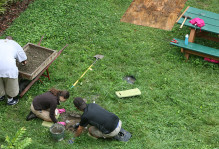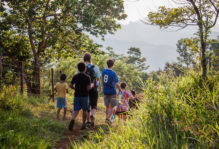Engaged scholarship and change
My work with the student projects in the Dominican Republic and Nicaragua represents the high point of my career-long efforts to integrate learning, teaching, research, and the practical application of systematic methods and theory. It involves a complicated combination of research, inquiry-based learning and teaching, and engaged scholarship. Ernest Boyer (1990; 1996) and others (cf. Ramaley, 2004) have written about “engaged scholarship” as melding discovery, integration, application, and teaching. Others have pointed to prospects for syntheses in “engaged learning” or “engaged scholarship and teaching. My experience suggests that scholarship that is situated at the center of compelling human problems and in the context of a desire to help magnifies opportunities for teaching, learning, and all of the kinds of scholarship that Boyer identified. That is not to say that such work is unproblematic. Intersections of the “known” and the “believed” can be painful. The urgency to help threatens to overwhelm discipline, method, and evidence. Teaching and learning of this sort rarely can be ordered simply or made linear conveniently. Assumptions about teaching “foundations” and the progressive development of skills and knowledge almost certainly will be challenged. To date, my efforts have been encouraged by several factors, which may be coincidental – or not:
- Working with students who want to improve health and health care has required inter-disciplinary perspectives. The subjects and objects of scholarship defy disciplinary boundaries (consider: health, change, service). The inadequacy of a dominant discipline or perspective encourages humility. Humility (and the nature of the subject matter) encourages, or at least permits, an experimental perspective and an inquiry-based approach to learning and teaching.
- Students drawn to these projects have come in about equal numbers from pre-med, public policy, global studies, and social science interests and majors. I cannot assume any common foundation of knowledge or perspective and, because students continue in subsequent semesters in these projects, I cannot “re-teach” foundations materials at the start of each semester of the continuing courses. I cannot be the expert – or, at least, the sole expert.
These may not seem like benefits. For me, they have enlivened or re-enlivened a sense of hope. Having spent a good part of my career focused on policy-relevant research and a belief in evidence-based policy making, I had become a little disillusioned. I listened to keynote speaker (and Attorney General) Janet Reno tell a relatively small group of academic criminologists that we needed to do better in providing policy relevant research findings along with the political cover that would be necessary to act on the research. That doesn’t seem unreasonable, but it left me uncertain about some ethical questions and the role that I prefer for myself.
I chose sociology as an undergraduate major because I was intrigued by the concept of community. From my earliest studies, I saw “community” as a potentially powerful concept and a woefully un-studied reality. Typically, the word is used in vague and nominal terms: it refers to some collection of people, some entity with a place name, or simply to something that everyone knows. My work in “community building,” has reminded me of the realities of community and the importance of those realities for promoting change that is powerful and sustainable.
I worry about volunteer and service projects, and I remain less than completely clear about the meaning of “service learning” and “engaged scholarship.” I encourage students in the two community health projects with which I work to recite several mantras, including these two:
Good intentions are dangerous things.
Every helping act is a political decision.
The students with whom I’ve worked uniformly want to do more than “be nice to needy people.” They believe that they can make a positive difference through their efforts, though they are not very clear about how they can or should do that. Those who have had Sharpe experiences (and some others) are sensitive to ego- and culture-centric assumptions, and they are reflective about what they do and don’t know. They nonetheless regard themselves as agents of positive change, mostly looking for a method and some resources. They respond enthusiastically to the general idea that knowledge is a powerful tool. Often, they want knowledge about the locality, state, nation, disease, or malady that they’ve chosen to engage. Beyond that, they’re uncertain about what they need to know, what they should do, and how they should proceed.
To date, I have offered one option: Engage a community; understand it as its people do (through ethnographic methods); through systematic research and knowledge, partner with the community to pursue change that is valued by community residents and that can be owned and sustained by the community. That may seem a little simpler than it is, but the core idea is not complicated. And, it embodies an approach that fits perfectly with my longest held ambitions for my career. I love working with students, challenging them and myself to examine, inquire, and explore the partly known, the unknown, and the misunderstood. I regard teaching and scholarship as complexly entangled, but for me, most simply, my scholarship is a force for and the rationale of my teaching.




No comments.
Comments are currently closed. Comments are closed on all posts older than one year, and for those in our archive.